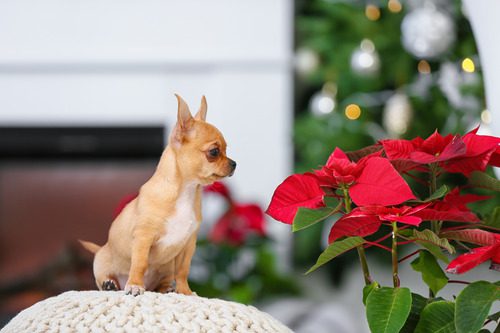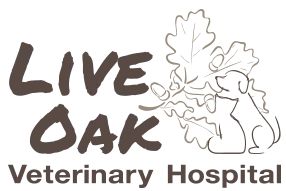Poinsettias are a popular holiday plant, often associated with festive cheer and vibrant red blooms. However, when it comes to your dog’s safety, you might wonder: are poinsettias poisonous to dogs? This is a necessary concern among pet owners, especially during the holiday season when these plants are everywhere. If you’re concerned about your dog’s safety around poinsettias, contact Live Oak Veterinary Hospital at 209-432-9437 or book an appointment online.

Poinsettia Toxicity & Its Impact on Dogs
Poinsettias have long been rumored to be highly toxic to pets, but the truth is a bit more nuanced. While it’s true that poinsettias contain compounds that can be harmful to dogs, the level of toxicity is generally considered mild. The plant’s milky white sap contains chemicals called diterpenoid euphorbol esters and saponin-like detergents, which can cause irritation if ingested or if they come into contact with your dog’s skin or eyes.
What Are Some Symptoms of Poinsettia Ingestion?
If your dog ingests parts of a poinsettia, the symptoms are usually mild and self-limiting, but they can still be uncomfortable for your pet. Common symptoms include:
- Drooling
- Nausea
- Vomiting
- Diarrhea
- Pawing at the mouth or eyes
- Redness or irritation around the mouth, eyes, or skin
How Dangerous Are Poinsettias Compared to Other Plants?
While poinsettias are mildly toxic to dogs, they are not as dangerous as other common holiday plants. For instance, mistletoe and holly can cause more severe reactions, including low blood pressure, seizures, and even death in extreme cases. Poinsettias, on the other hand, rarely cause more than mild gastrointestinal upset.
Comparing Poinsettias to Other Holiday Plants
- Mistletoe: This plant is far more dangerous than poinsettias. Ingestion can lead to gastrointestinal upset, cardiovascular collapse, and respiratory issues. Immediate veterinary care is necessary if mistletoe is ingested.
- Holly: Holly berries contain substances like saponins, which can cause severe vomiting and diarrhea. The spiny leaves can also cause mechanical injury to the mouth and throat.
- Lilies: Though not typically a holiday plant, lilies are extremely toxic to cats and can cause kidney failure. For dogs, lilies can cause mild gastrointestinal symptoms.
While poinsettias are relatively low on the toxicity scale, it’s still wise to keep them out of reach of your pets, especially if your dog is prone to chewing on plants.
What Should You Do If Your Dog Eats a Poinsettia?
If your dog happens to nibble on a poinsettia, the first step is to assess the situation. Determine how much of the plant your dog ingested and immediately take away any remaining parts of the plant from your dog to prevent further ingestion. If your dog shows signs of irritation, gently rinse their mouth with water to remove any lingering sap and keep a close eye on them for the next few hours. If symptoms persist or worsen, or if your dog has ingested a large amount of the plant, call Live Oak Veterinary Hospital at 209-432-9437.
Ways to Prevent Poinsettia Poisoning in Dogs
The best way to protect your dog from poinsettia poisoning is to prevent access to the plant altogether. This can be especially challenging during the holiday season, but there are a few strategies you can use to keep your dog safe.
- Position poinsettias on shelves, tables, or mantels that are out of your dog’s reach. This is especially important for larger dogs that can easily reach lower surfaces.
- If your dog is particularly curious, consider using barriers like baby gates or closed doors to keep them away from areas where poinsettias are displayed.
- Artificial poinsettias can provide the same festive look without the risk of toxicity. Just make sure they are made of pet-safe materials.
- When you’re decorating or hosting guests, keep an eye on your dog to ensure they don’t get into any plants.
While poinsettias may pose a mild risk to your dog, they don’t have to be completely off-limits in your holiday decor. If you’re aware of the potential risks and take steps to mitigate them, you can keep your dog safe and still enjoy the festive atmosphere. If you have any concerns about your dog’s health, especially if they’ve come into contact with a poinsettia or any other potentially toxic plant, please call Live Oak Veterinary Hospital at 209-432-9437 or book an appointment online.
